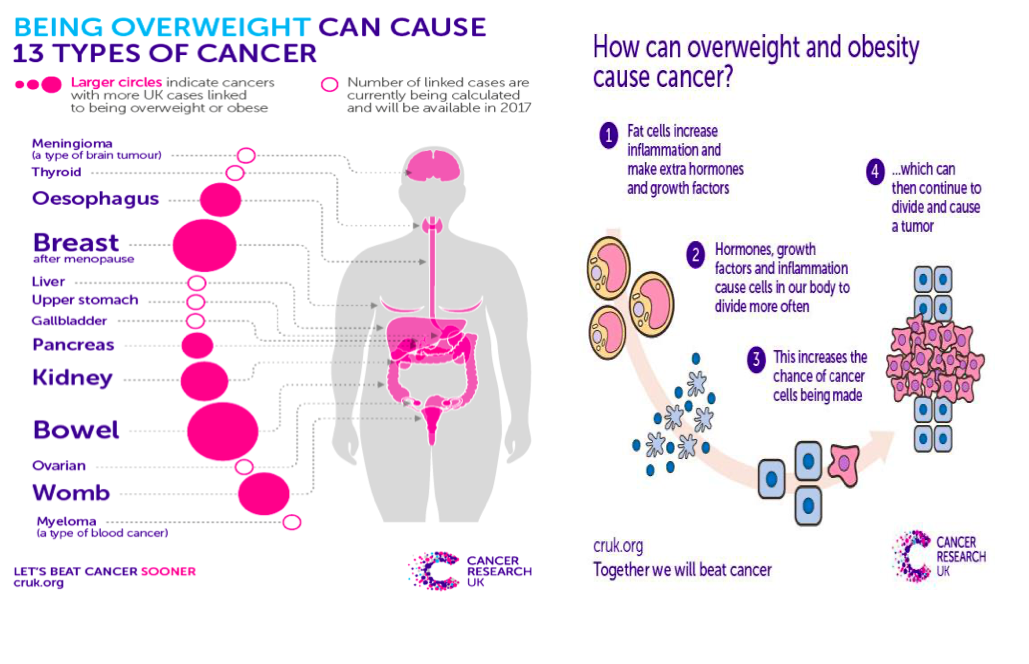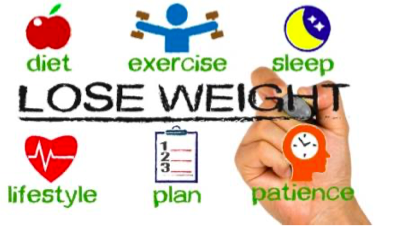Being overweight doesn’t mean that patients will definitely develop cancer. But if you are overweight you are more likely to get cancer than if you are a healthy weight.
“Prevention is Key”
The theme for this month’s EONS cancer prevention campaign, PrEvCan, is Take Action to be a Healthy Body Weight, and we are asking everyone to take part in the ‘Waistline Challenge‘ over the next three months.
Weight and cancer risk – what is the evidence?
“Will losing weight improve my overall health? Will it lower my cancer risk?”
Eating well and being more active are the best ways to improve your health if you are overweight or obese. Losing as little as 5% to 10% of your total body weight can reduce your risk of developing cancer. It may seem like a small amount, but research shows that it can improve your health.

Researchers are still studying the connection between body weight and cancer risk. However it is known that:
- Fat cells can affect the way your body controls the growth of cancer cells.
- Extra adipose tissue (weight) can potentially raise the levels of the hormones, insulin and
insulin growth factor-1 (IGF-1). - Fat tissue can produce more of the hormone oestrogen, which can potentially cause the development of some cancers including breast cancer.
- Chronic, low-level inflammation is more common in people who are obese (particularly if they have more belly fat) , which is linked with an increased cancer risk.
How will I know if I am a healthy weight?
There are different ways of finding out if you are a healthy weight:
Body mass index (BMI)

Click here to use our BMI calculator, designed by Safefood.eu.
Remember, though, BMI is not always an accurate measure if you are an athlete, pregnant or very short in height.
Taking control of your weight
- Weight gain happens when you take in more energy than you use up. Losing weight is a gradual process which takes time. There are no quick fixes.
- Being a healthy weight is about getting the balance right between what you eat and how active you are. To lose weight permanently, you will need to change the way you think about food and physical activity for good. Be realistic. For most people who are overweight, losing one or two pounds a week is excellent progress. Some weeks will be more difficult than others, the key is to keep going.
Looking after your wellbeing is most important.
Maintaining your weight through diet
Everyone develops habits and sometimes these can be hard to break – here are some helpful tips to combat those habits:
- Eat mostly vegetables, fruits, lean proteins, and whole grains.
- Eat foods that make you feel full, including healthy fats such as nuts, fish, and olive oil.
- Avoid highly processed foods like chips, white breads, cookies and packaged foods with many artificial ingredients.
- Avoid sugary drinks, such as fruit juice, soda, and other drinks with a lot of sugar. Check the sugar and calories in your coffee and any alcoholic drinks.
Small Steps, Big Changes

Here are some things that can help make more healthy choices:
- Make small changes to your exercise routine. In the dark days of winter this can be more difficult. However, this is a good excuse to join an exercise class, meet people and put fun into your weekly routine. A few extra minutes of exercise a day lowers your cancer risk.
- Set a goal of doing 30 to 60 minutes of physical activity on most days of the week. Physical activity can be moderate or intense. Take a brisk walk, join an exercise class, or go for a run. If you cannot get 30 to 60 minutes, do what you can.
- Keep an activity diary. Small changes make a big difference - writing this down in a diary can sometimes help. You can also make a log of what you are eating and most importantly why you are eating – for example if you are tired – it allows you to get to know yourself and your triggers.
- Get support. It is important to feel supported when trying to make lifestyle changes. Linking in with your local cancer care group can help, or if you wish you can try an online confidential group such as Macmillan or your national cancer society, such as the Irish Cancer Society.
PrEvCan:
Download lots of great tools from the EONS PrEvCan webpage www.cancernurse.eu/prevcan and share the messages with your patients to help you to discuss lifestyle factors without blaming or shaming. There are also lots of great videos available to help you spread the PrEvCan messages too.
A positive approach and evidence-based information will help us all to reach our weight-loss goals! Tell us what you are doing to reach a healthy body weight by posting your ‘Waistline Challenge’ photos or short videos on social media: #PrEvCan #CANCERCODE @cancernurseEU
Helpful Links:
- World Cancer Research Fund/American Institute for Cancer Research. Body Fatness and Weight Gain and the Risk of Cancer (World Cancer Research Fund International, London, 2018).
- Global Burden of Disease Cancer Collaboration. Global, regional, and national cancer incidence, mortality, years of life lost, years lived with disability, and disability-adjusted life- years for 32 cancer groups, 1990 to 2015: a systematic analysis for the global burden of disease study. JAMA Oncol. 2017;3:524–548. doi: 10.1001/jamaoncol.2016.5688.
- NCD Risk Factor Collaboration. Worldwide trends in body-mass index, underweight, overweight, and obesity from 1975 to 2016: a pooled analysis of 2416 population-based measurement studies in 128.9 million children, adolescents, and
adults. Lancet. 2017;390:2627–2642. doi: 10.1016/S0140-6736(17)32129-3. - Lauby-Secretan B, et al. Body fatness and cancer--viewpoint of the IARC Working Group. N. Engl. J. Med. 2016;375:794–798. doi: 10.1056/NEJMsr1606602.
- Keum N., et al. Adult weight gain and adiposity-related cancers: a dose-response meta- analysis of prospective observational studies. J. Natl. Cancer Inst. 107, pii: djv088 (2015).
- Midthjell K, et al. Trends in overweight and obesity over 22 years in a large adult population:
• Macmillan cancer support
https://www.macmillan.org.uk/cancer-information-and-support/impacts-of-cancer/healthy-eating- and-cancer
• The Irish Cancer Society
https://www.cancer.ie/cancer-information-and-support/cancer-prevention/diet-and- cancer/the-five-fundamentals-of-healthy-eating
• American Cancer Society https://www.cancer.org/healthy/eat-healthy-get-active/acs-guidelines-nutrition-physical-
activity-cancer-prevention/guidelines.html
All images courtesy of GoogleTM
References
the HUNT Study, Norway. Clin. Obes. 2013;3:12–20. doi: 10.1111/cob.12009. |